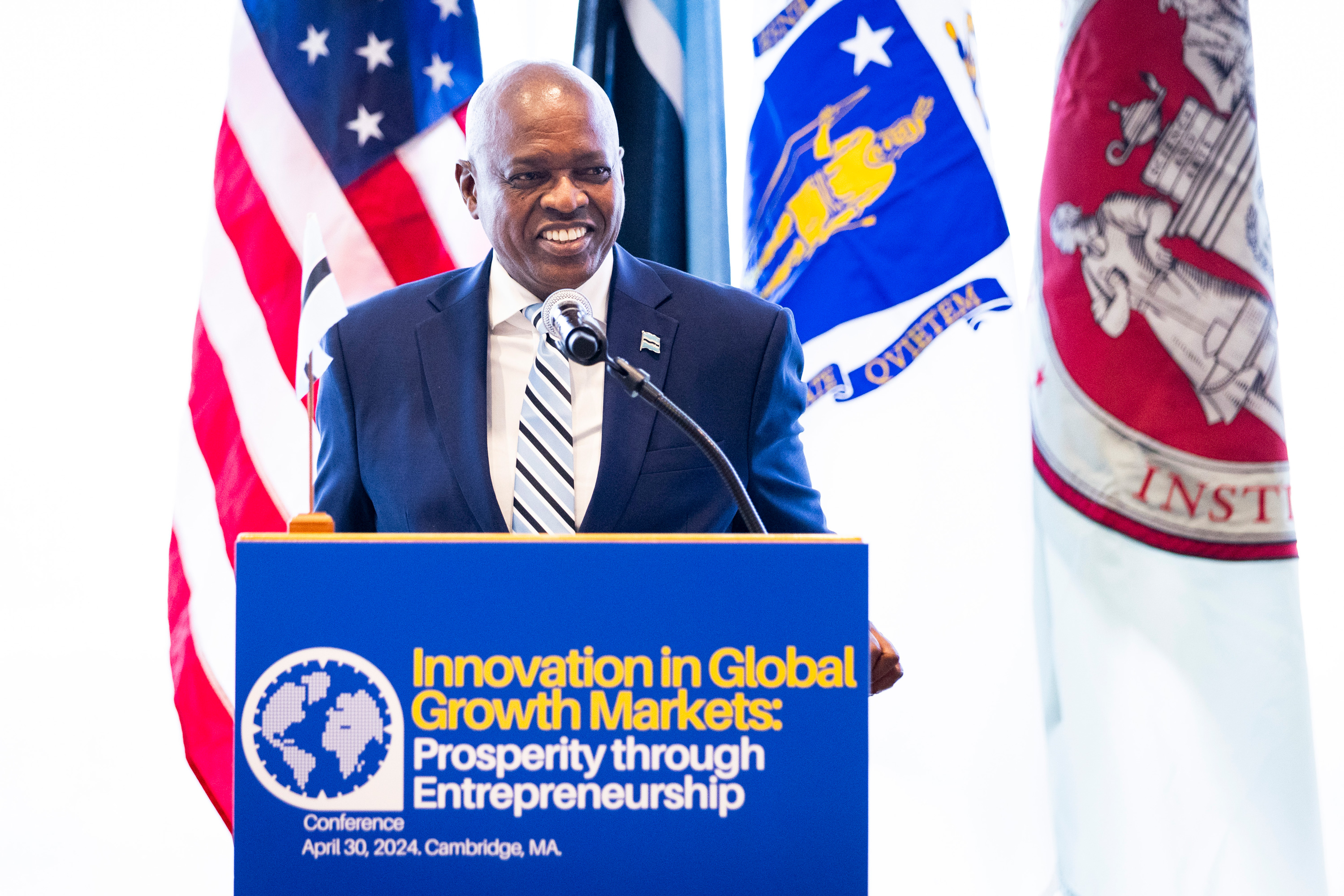
President Mokgweetsi Masisi of Botswana visited the Legatum Center for Development and Entrepreneurship at MIT on Tuesday, delivering a speech on the value of entrepreneurship in growing economies and affirming an interest in working with the center on spurring innovation in his own country.
“Innovation is … not a privilege for the few, but a powerful tool that should be accessible for all,” Masisi said during a speech at the Legatum Center’s “Innovation in Global Growth Markets: Prosperity Through Entrepreneurship” conference, marking the center’s 15th anniversary.
Botswana, Masisi said, should undertake a “deliberate effort to deliver a vibrant innovation ecosystem by increasing investment in science, technology, and innovation, thus creating space for our current and future generations … to thrive and ensure an improved quality of life” in the country.
MIT President Sally A. Kornbluth also spoke at the event, highlighting the ways that the Legatum Center — which is part of the MIT Sloan School of Management — enables innovation-driven economic growth.
The goal, Kornbluth said, is to “help advance innovative ideas that have the potential for real impact and require long-term investment to succeeed; help connect promising entrpreneurs with investors, mentors, and advisors; and provide the resources that are needed to develop, scale, and deploy their solutions.”
Kornbluth also highlighted MIT’s new effort to combat climate change, the Climate Project at MIT. She noted that more than a quarter of MIT faculty have already been working on climate issues but that the new Institute-wide effort can produce “ways to have talented people do more together than they can do alone, so that we can help direct that collective power to deliver climate solutions to the world, in time.”
Georgia Perakis, the John C Head III Dean (Interim) of MIT Sloan, also delivered remarks at the conference, noting that MIT Sloan and the Legatum Center are committed to “educating principled innovation leaders and entrepreneurs who will make a difference and have an impact in the world.” She added, “And I know with the support of everybody here, this is what we are accomplishing.”
In addition to his appearance at the conference, Masisi, along with a delegation of government leaders from Botswana, met directly with Kornbluth, as well as with Dina H. Sherif, executive director of the Legatum Center, and other MIT administrators and faculty members.
In opening remarks at the conference, Sherif observed, “The majority of the world’s growth now comes from what has historically been referred to as the developing world. It is time for us to start recognizing that our time is now. We are not rising. We are here, we are strong, and it is up to us to create the prosperity that we need.”
Sherif added: “Long heralded as a regional reference for good governance and stability, Botswana is now uniquely positioned to become more influential globally and set an example for a rapid transition to a knowledge economy, leading the path for the rest of Africa.”
Masisi has been president of Botswana since 2018. He served as the country’s vice president from 2014 through 2018 and as a member of parliament from 2009 through 2018. The son of a longtime Botswana politican, Edison Masisi, he has a BA from the University of Botswana and an MA from Florida State University.
Botswana has one of the highest per-capita incomes in Africa. The country gained independence from Britain in 1966 and has been a democracy ever since. However, leaders are continuing to examine ways of diversifying the country’s economy.
As such, Botswana and the Legatum Center issued a memorandum of understanding to explore new ways to enhance innovation-driven growth in the country. Elements of the memorandum include establishing a fellowship for African innovation-driven entrepreneurs and student fellows in the mode of the Legatum Center’s fellowships, accelerating the country’s digitalization through uses of artificial intelligence, building an MIT Sandbox program to encourage entrepreneurship within Botswana, participation in the MIT Regional Entrepreneurship Acceleration Program, and possibly other joint activities.
For its part, the Legatum Center also issued a report summarizing its 15 years of impact in global growth markets. The center was initially housed in the MIT School of Architecture and Planning, during which it supported graduate students from all five schools at MIT. It then became part of the MIT Sloan School of Management in 2014.
The Legatum Center’s Student Fellowship supplies MIT students with curriculum, tuition support, advisor networks, and experiential learning opportunities to help drive their venture ideas ahead. So far, the center has provided over $10 million in fellowship funding to 326 fellows. In turn, those Legatum Fellows have created 282 ventures, about three-quarters of which still exist, raising over $1 billion in funding and creating over 17,000 jobs by themselves.
Among the center’s core aspirations has been to “create a home for immensely talented and promising young entrepreneurs,” said Legatum Group CEO Mark Stoleson, during an interview with MIT News between conference panel sessions.
In turn, Stoleson added, those Legatum Fellows will then “hopefully go back to the countries they came from and start businesses, create jobs, and be leaders within the ecosystem of entrepeneurship and prosperity within their countries.”
